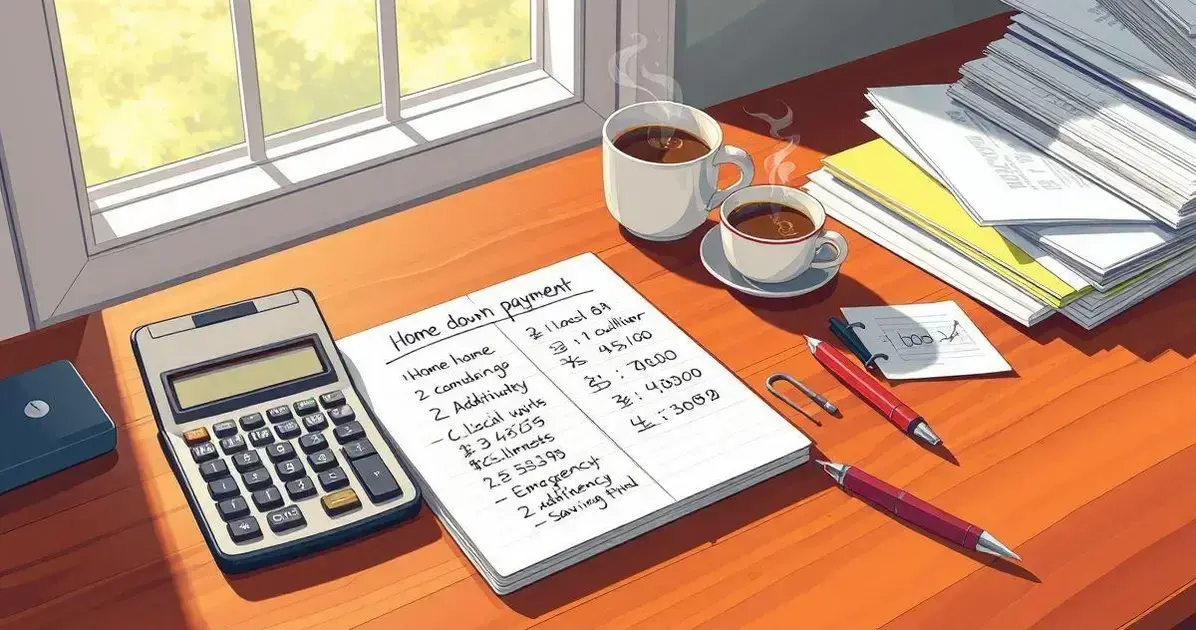How Much Money in Savings to Buy a House is one of the first questions people ask when they start thinking about homeownership. And honestly, it’s a smart place to start — because buying a home isn’t just about qualifying for a mortgage, it’s about being financially prepared.
From down payments to closing costs and even emergency funds, there’s more to consider than most people expect. The amount you need can vary a lot depending on your goals, location, and current financial situation.
If you’re ready to turn the dream of owning a home into a real plan, you’ll want to understand exactly how much to save — and how to get there faster. Keep reading for practical tips that make the whole process easier to navigate.
Understanding the Savings Needed for a Home
When considering how much money in savings to buy a house, it’s essential to understand the various savings needed to make your homeownership dream a reality. The amount required can vary significantly based on factors such as the type of home you want, current real estate market conditions, and the area where you plan to buy.
Down Payment Requirements
The most significant part of your savings will likely be the down payment. Traditionally, it was advised to save 20% of the home price for a down payment. However, many lenders now accept lower percentages, with some programs allowing as little as 3% to 5%. Keep in mind that a lower down payment usually means paying for private mortgage insurance (PMI).
Closing Costs
Another crucial element to factor into your savings is closing costs. These can add up to 2% to 5% of the home price and include fees for title insurance, appraisals, and attorney services. Knowing this will help you set aside additional funds beyond your down payment.
Emergency Fund and Move-In Expenses
It’s also important to consider having an emergency fund after you buy a home. This fund should cover at least 3 to 6 months of living expenses. Additionally, remember to budget for move-in expenses such as repairs, furniture, and utility deposits. These costs can often be substantial and are sometimes overlooked.
In summary, understanding the savings you need for a home involves assessing not only the down payment but also closing costs, emergency funds, and move-in expenses. By preparing thoroughly, you can ensure a smoother transition into homeownership.
Factors Influencing Savings Amount
When determining how much money in savings to buy a house, several factors can influence the required savings amount. Understanding these factors can assist you in setting realistic financial goals for homeownership.
1. Location
The area where you wish to buy a home greatly affects the price. Locations with higher demand or excellent school districts often have higher property values, leading to larger down payments and savings needed.
2. Type of Home
The type of home you choose can also impact your savings. A single-family home typically costs more than a condo or townhouse. Therefore, knowing what kind of home you want will help in estimating your savings.
3. Market Conditions
Current real estate market conditions play a significant role. When demand is high and inventory is low, home prices can surge, increasing the overall savings needed. Conversely, a buyers’ market may offer lower prices and less competition.
4. Interest Rates
Interest rates can also affect your overall costs. Lower interest rates can reduce monthly payments, which might allow you to allocate more money toward savings for a larger down payment if you choose. Keeping an eye on the rates can help you decide the right time to buy.
5. Personal Financial Situation
Your financial situation, including your income, credit score, and current debts, will also influence how much you need to save. A higher credit score may qualify you for better mortgage terms, reducing the amount you need to save.
6. Government Programs
Various government programs can help first-time homebuyers build equity with lower down payments. These may influence how much you need to save. Being aware of these options can significantly lower the barrier to home ownership.
By considering these factors, you’ll be better equipped to determine how much money in savings you need to buy a house effectively.
How to Calculate Your Required Savings

Calculating your required savings for buying a house involves several steps. Using a systematic approach helps ensure you set realistic and attainable savings goals. Follow these steps to determine how much you need to save.
1. Determine the Home Price
First, decide on a target home price based on your preferred location and the type of home you want. Research the average prices in your desired area to establish a reasonable estimate.
2. Calculate Your Down Payment
The next step is to calculate your down payment. If you aim for a 20% down payment, multiply your target home price by 0.20. For example, if your target home price is $300,000, your down payment would be $60,000.
3. Estimate Closing Costs
Closing costs typically range from 2% to 5% of the home price. To calculate this, take your target home price and multiply it by 0.02 to 0.05. For a $300,000 home, closing costs could range from $6,000 to $15,000.
4. Add Emergency Fund
Having an emergency fund is crucial. Aim to save at least 3 to 6 months of living expenses. Calculate your monthly expenses and multiply by 3 to 6 to determine your emergency fund target. For example, if your monthly expenses are $3,000, you’d need between $9,000 and $18,000.
5. Total Your Savings Requirement
Now, combine all these numbers to find your total savings requirement. Add your down payment, estimated closing costs, and emergency fund to get the full amount you need to save.
For instance, using our previous examples:
Down Payment: $60,000
Closing Costs: $10,000 (average)
Emergency Fund: $12,000 (average)
Total Savings Needed = $60,000 + $10,000 + $12,000 = $82,000.
By following these steps, you can calculate how much money in savings you require to buy a house effectively.
Tips for Building Your Savings Fast
Building your savings quickly is essential if you want to buy a house. Here are some effective tips to help you accumulate your savings faster.
1. Set Clear Savings Goals
Having a specific savings target makes it easier to focus your efforts. Determine how much you need for a down payment, closing costs, and an emergency fund. Break these down into monthly savings goals to stay motivated.
2. Create a Budget
A budget helps you see where your money goes and where you can cut back. Track your spending for a month, then identify areas where you can save, such as dining out or subscription services. Allocate these savings to your house fund.
3. Open a High-Interest Savings Account
Consider opening a high-interest savings account for your home savings. These accounts often offer better interest rates than traditional accounts, allowing your savings to grow faster.
4. Automate Your Savings
Make saving easier by setting up automatic transfers from your checking account to your savings account. Treat your savings like a recurring bill, so you don’t spend that money before saving it.
5. Reduce Unnecessary Expenses
Look for ways to cut back on non-essential expenses. Consider making meals at home instead of eating out, canceling unused subscriptions, or finding cheaper entertainment options. Put the money saved directly into your house fund.
6. Increase Your Income
Boosting your income is another effective way to speed up your savings. Consider taking on a part-time job, freelancing, or selling items you no longer need. Direct any additional income generated into your savings account.
7. Use Tax Refunds and Bonuses Wisely
If you receive a tax refund or a work bonus, consider using this money to boost your savings. Instead of spending it, deposit the entire amount into your savings for your new home.
By following these tips, you can build your savings faster and get one step closer to buying your dream house.
The Importance of a Good Credit Score
A good credit score is essential when looking to buy a house. It can significantly influence your ability to secure a mortgage and the terms you receive. Here are some reasons why maintaining a good credit score is important.
1. Better Mortgage Rates
Generally, the higher your credit score, the lower your interest rates will be. A lower interest rate can save you thousands of dollars over the life of your loan, making homeownership more affordable.
2. Higher Loan Amounts
A good credit score can also help you qualify for a larger loan amount. Lenders are more likely to trust borrowers with higher credit scores, allowing them to lend more money for your home purchase.
3. Lower Down Payment Requirements
Some lenders offer special programs for borrowers with good credit scores that allow for lower down payments. This means you might not need to save as much upfront, easing the financial burden when buying a home.
4. Increased Chances of Approval
When you have a good credit score, lenders see you as a lower risk. This increases your chances of getting approved for a mortgage, especially in competitive markets where multiple buyers may be interested in the same property.
5. Easier Approval for Other Loans
A good credit score benefits you beyond home buying. It can help you qualify for other loans, such as car loans or personal loans, often with the same favorable terms. This adds to your overall financial flexibility.
6. Rental Opportunities
If you are considering renting first or investing in rental properties, landlords often check your credit score. A good score can enhance your chances of being approved for rental applications.
Maintaining a good credit score is vital for achieving your homeownership dreams. Regularly check your credit reports, pay bills on time, and limit new credit inquiries to ensure you keep your score in great shape.
FAQ – Frequently Asked Questions about Buying a House
What is the ideal amount to save for a down payment?
Generally, it’s recommended to save at least 20% of the home’s price for a down payment, but many lenders accept lower amounts.
How can I calculate my required savings for home buying?
To calculate required savings, estimate your down payment, closing costs, and an emergency fund, then add these amounts together.
What additional costs should I consider when budgeting for a home?
In addition to the mortgage, consider property taxes, homeowner’s insurance, maintenance, utilities, and any HOA fees.
How does my credit score affect my home buying process?
A good credit score can lead to better mortgage rates and terms, making homeownership more affordable.
What are first-time homebuyer programs?
These programs are designed to assist first-time buyers with down payment assistance, lower interest rates, and other helpful benefits.
What realistic expectations should I have when buying a home?
Understand your budget, be flexible with your wish list, recognize that the process takes time, and consult professionals for guidance.

